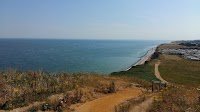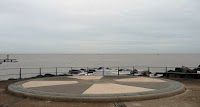The Essex Coast - Great Oakley to Walton-on-the-Naze

A 10 mile along the Essex Coast from Great Oakley to Walton-on-the-Naze
The walk follows the edge of the marshes in front of Skipper Island and Horsey Island and the Naze with little views of the open sea. The route is predominantly defence banks that border the creeks and springs that meander through the marshland. There is plenty to see from the wild life to the decaying hulls of wrecked boats that sit disregarded on the mud banks.

Walk Statistics
- Start location: Great Oakley
- End location: Walton-on-the-Naze
- Distance: miles ( km)
- Total Gain: ft ( metre)
- Total Descent: ft ( metre)
- Min Height: ft ( metre)
- Max Height: ft ( metre)
- Est. Walk Time:
- Walk type: Linear
- Walk Grade: Easy
- Terrain: Footpath, Road
- Obstacles: It should be stressed that the broad sandy beaches are prone to cut off from tides with quicksand hazards. It is therefore wise to stick to the promenade
Maps
The following maps and services can assist in navigating this route. There are links to printed maps and links to downloadable GPX route data for importing into navigational software and apps.
- Ordnance Survey Explorer Map
- OS Explorer 184 - Colchester
- GPX Route File
Walk Notes
This walk was undertaken as the second stage of a weeks walking along the Essex Coast between Manningtree and Maldon. The day held a stiff breeze that swept across the marsh in a direction that was predominantly against our direction of travel. Under normal conditions this is unwelcome but atop the exposed defence banks it made the going noticeably tough. The defence banks were also rock hard and it has to be said that the 10 miles completed seemed a lot further by the end of the day.
Transport and Accommodation
When this walk was undertaken we set up a base camp at Grange Farm Camp Site in the village of Thorpe-le-Soken. This gave a central location for easy access to the whole of the Tendring Peninsula with good public transport services throughout. The site was close to the village centre and its bus stops and the local train station was no more than a short walk away. Despite being close to the village centre the site was quiet although an owl became constant company each evening with its soft hooting as we drifted into restful sleep after each days walk.
At the time of the walk, the First group bus service 3/4 ran from Thorpe-le-Soken to Great Oakley and the railway linked Walton and Thorpe-le-Soken which provided links to both ends of this walk. It is suggested that anyone contemplating undertaking this to consult Traveline to determine the up-to-date services and operators.

The Route
The route cuts across open countryside from Great Oakley before following footpaths down to Beaumont Quay. The paths were not well defined across the open farmland having been obliterated by recent ploughing. With assistance from a local chap to point us the the right direction, no mistakes were made and we were promptly heading down to the defence banks. At Beaumont Quay lies the wreck of a 42 ton barge named The Rose which was first launched in 1880. It worked a coastal route for 50 years before becoming a what is known as a 'lighter', a towed barge with no independent means of propulsion. It was sold in the 1960s but never restored and now lies decaying in the mud at Beaumont Quay.
The path continues on to Kirby Quay where the Quay House stands alone next to the quayside. This was actually a Granary up until sometime around 1920. During those times barges would tie up alongside the Quay house bringing and taking their cargoes of grain and coal. By the middle of the 19th Century, with the advent of the railways, trade migrated away to the faster transportation leaving the quay to flounder with little trade.

When this walk was undertaken there was no official right of way along the defences beyond Kirby and a mobile lifting contraption and a JCB blocked the defence banks beyond the quay. According to Peter Catons book, 'Essex Walk', there are difficulties in negotiating this part of the path and it was decided the best option would be to walk into Kirby-le-Soken then follow the road into Walton-on-the-Naze. The England Coast Path has subsequently also ignored this section selecting the road as the chosen route, therefore it would appear our decision was well founded.
Just up the road from where Quay Lane joins the main road is the Ship Inn, the Kirby-le-Soken village local. This is opposite direction to Walton but not far out of the way. It was a quiet afternoon and there was no more than a scatter of old characters at the bar conversing with the landlord. A quick pint of beer was enough refreshment to enable us to continue the walk along the roadside pavement. This is a fairly busy thoroughfare and not the most interesting of walks. Therefore this was no more than a task of getting to our finishing line at Walton Pier and then seeking out the train station.
The early evening ushered in dusk with just enough light left to have a perusal of the pier and then another pint of beer was downed at the The Walton Tavern, a sea front bar that probably has a booming trade during holiday periods. The interior is decorated with photos of old Walton which are worth taking time perusing whilst supping ones beverage. The ale on offer was Sharps Doom Bar, and this was a good example of this ale, far from its Cornish home. Certainly during the time of this walk it was a sought after beer, but in the intervening time the Sharps Brewery was taken over by Molson Coors and the brew has become nothing more than a bland sweet brew for the masses.

The end of the day was the return train journey to the campsite. It was thought this would be a simple and painless journey, however this did not prove quite as easy as expected. All journeys in this area require passengers to have a ticket prior to travel or, as notices on the station platform clearly warned, fines would be handed out to those not in possession of such an artefact. There was no ticket kiosk open but there was a ticket machine but that is all it appeared to be. No way or means to determine destination or fare. Just a ticket machine. A machine that took money and issued a ticket. No instructions or references to places served or fares available. A telephone was secured on one of the pillars adjacent to this machine and upon this device was a single button that exclaimed 'Help!' Having deduced this was not a cry for assistance by a poor mute telephone, but merely an indication that one could access helpful information, I picked it up the receiver was immediately transferred to a call centre that appeared to be located somewhere in India. The person at the other end appeared to know little about fare structures on the railway network of coastal East Anglia other than stating that I needed to purchase a ticket. I am quite sure I could similarly set up a call line for Bombay train station and offer similar advice. Eventually a guestimate was supplied. I hung up and secured a ticket with this guestimated fare.

When the train arrived and whisked us away, more information was supplied from another passenger. The idea was that a potential passenger has to guess the fare then the ticket collector exchanges your guestimate ticket for a real ticket at the correct fare. This system seems to be open for abuse. Buy a ticket for as little as possible and then alight before the ticket collector gets a chance to question you. Indeed, on this journey the collector only got to us minutes before the train pulled into our station. What a way to run a railway. This was in the days when National Express ran the East Anglian railways and whether this fiasco method of ticketing is still the case is unknown.
Route Validation Cards
Validation Date - 06/09/2010
- Time of Walk: 10:00 to 15:30
- Validators: griff, kat
- Weather Conditions: hazy
- Notes: Initial route undertaken
Summary of Document Changes
Last Updated: 2026-01-12
- 2010-09-14 : initial publication of summary
- 2021-03-17 : Update website improvements and removal of ViewRanger reliance
- 2021-12-01 : Removal of ViewRanger links due to its imminent demise
- 2022-01-12 : recast to new format with rewrite
Coast Walk , Distance:long , Essex , Essex Coast Walk , OSmap:184 , summary






0 comments:
Post a Comment